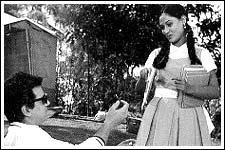| Interview |
 | I'm a strict mother: Jaya Bachchan |
| | |
| "Motherhood means everything to me," asserted Jaya, who gave up tinsel town after vintage hits like "Koshish" and "Guddi" and returned to the screen only after her children had grown up. "I don't care what the world thinks as long as my children have faith in me. My children are more important to me than even my husband (Amitabh Bachchan)," Jaya told IANS in an interview. Hoping she had passed on "decent values" to her children, the actress added: "The name, fame, glamour...it all vanishes. What survives is goodness." Excerpts from the interview: Q: Most people see you as 'Mother No.1' in the film industry. A: Motherhood means everything to me. My children are more important to me than even my husband. Q: You gave up you career at its peak. Was it for marriage or motherhood? A: Definitely motherhood. I come from ahomewhere my mother was always around. Just her presence gave me a lot of strength. I became the person that I am because of her. Mothers don't have to teach you anything. Instinctively, a child imbibes values and mannerisms from the mother. From the way you eat to the way you treat people, your mother's influence is always there, regardless of whether she exercises the influence or not. Q: Are you a very strict mother? A: Very. I'm an extremely strict mother. And it isn't because my children were susceptible to being spoilt. We never allowed that. We were in a joint family. My children and my bother-in-law's children grew up together. They played and ate together, went to the same school. They had a normal life. They knew their parents were celebrities - we didn't hide it from them. But they didn't know what that celebrity entailed. They were aware that there was public interest in them when they went out. But we made sure they grew up with the celebrity status being a normal state of being. We never had to explain their identity to them. Amitji and I have been honoured but never dazzled by our celebrity. As a couple, we've ensured that our children don't compromise or denigrate it. Q: How careful were you to give your children Abhishek and Shweta a normal childhood? A: I may be wrong, but I very strongly feel a guardian must be at home constantly. It could be a parent or an aunt or uncle. The presence at home needn't be gender-driven. Q: But in our society it's generally the mother who stays at home. A: I agree that is the norm. But let me tell you, when I decided to pause my career to look after my children, I never saw it as a sacrifice. The love, affection and respect the children give me today are more important to me than any other kind of success in the world. I don't care what the world thinks as long as the children have faith in me. Doesn't that apply to all parents? I don't think I'm an extraordinary mother. I come from a decent middleclass family. I've just behaved normally with my children. Q: To behave normally in the film industry isn't a normal thing to do. A: I don't think that's true. You're giving the film industry an unnecessarily abnormal tinge. In fact, the families in our film industry are very normal. I'm not saying the industry is perfect. It just seems more imperfect than other areas of activity because of the constant media attention. I'm fortunate to have come from a decent family. That's why I could give decent values to my children. Q: Your father (Taroon Kumar Bhaduri) was an eminent journalist. Was he around to watch you grow up? A: He was out making a living for his large family. But I never felt that my father wasn't around. I never felt the need for anything that I didn't have. I was very happy with my life. I was very proud of my parents. I hope my children remain that way. Q: Are you a good daughter? A: I try to be. I'm very duty-conscious. And I've become even more so now after marriage because Amitji is very conscious of his duties towards his parents. I've in fact learnt to be more duty-conscious through my association with the Bachchan family. I've been married for 34 years. It's a lifetime. I've lived longer with this family than I have with mine. From my own parents I've imbibed goodness and simplicity. God has been very, very kind to me. I hope I've given back to my children the values I've imbibed from both my families. But I know they've a long way to go. When they were growing up, I always told my children it didn't matter how they did in their exams. It's what they made of themselves as human beings that mattered. I remember when I was a child there were always a lot of red marks on the report card in some subjects, but the conduct column was always very good. That made my father very happy. He always said a good strong person has a better chance of survival in this world. I hope I've been able to give all these values to my children. The name, fame, glamour...it all vanishes. What survives is goodness. Q: Do you believe that family always comes first? A: Sometime good friends can be family too. When people originally said 'family first', we lived in a smaller society. Now the family has to be a lot larger. You have to be more generous. Q: Now that Shweta is in Delhi and Abhishek is constantly on the move, do you miss them? A: I miss their physical presence. Having them in the house is so reassuring. But I'm happy being on my own as well. I'm not a disgruntled person. My children used to be in boarding schools, but they were never really away from me. Thank god for cell phones. That instrument irritates me, but it plays a vital part in connecting me to the ones I love the most. Q: What do you think of the way mothers are projected in our films? A: Very stereotypical till recently and that was sad. Mothers have changed. And why just mothers in our films? Look at our mythology and real-life families where the matriarch had so many avatars and facets. But the portrayal is changing. In fact, there's hardly a mother in today's films except in Karan Johar's cinema. |
















comment:
p_commentcount